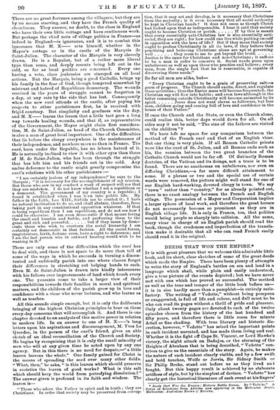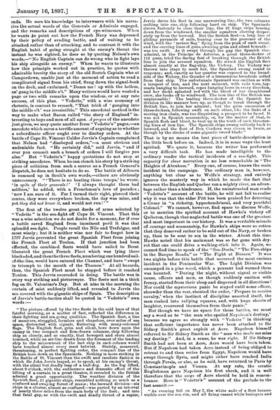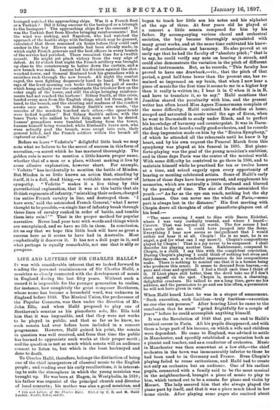DEEDS THAT WON THE EMPIRE.* IT is with great pleasure
that we welcome this admirable little book, and its short, clear sketches of some of the great deeds which made the Empire. There have been plenty of attempts to write the story of England's battles on sea and land in a, language which shall, while plain and easily understood, give a true picture of the events depicted ; but we have never met with one which has proved so successful. The method as well as the tone and temper of the little book before us— it is in size hardly more than a pamphlet—is entirely satis- factory. The writing of "Vedette," without being pompous or exaggerated, is full of life and colour, and dull must he be who can read its pages without a thrill of pride and pleasure. Only about twenty pages are devoted to each of the twelve episodes chosen from the history of the last hundred and fifty years, and therefore there is little room for minute detail or fine shading. With true literary and historic dis- cretion, however, "Vedette" has seized the important points in each incident narrated, and has made them living and real. Whether it is the fight off Cape St. Vincent, or Lord Ha.wke's victory, the night attack on Badajos, or the storming of the Heights of Abraham that is being described, " Vedette" con- trives to give us the essentials of the story. Again, he makes the nature of each incident clearly visible, and by a few swift and bold touches, Wolfe or Jervis, Sir Sidney Smith or Sir Philip Broke, stand out before us as they lived an I fought. But this happy result is achieved by no elaborate artifices of style, but by the simplest of devices. "Vedette" has clearly got the historical literature of each event at his fingers'
• Deeds that Won the Empire: Historic Battle Scenes. Br " Vede'te." A Series of Selection from Articles now appearing in the Ifelb3urne Argur. Melbourne: Australian Review of Reviews.
ends.. He uses his knowledge to interweave with his narra- tive the actual words of the Generals or Admirals engaged, and the remarks and descriptions of eye-witnesses. When he wants to point out how the French Navy was depressed by their policy of evading battle, and of waiting to be attacked rather than of attacking, and to contrast it with the English habit of going straight at the enemy's throat the instant he was sighted, he does so by quoting Nelson's own words,—" No English Captain can do wrong who in fight lays his ship alongside an enemy." When he wants to illustrate how this principle worked out in practice, he quotes with admirable brevity the story of the old Scotch Captain who at Camperdown, unable just at the moment of action to read a complicated signal from his chief, flung down the signal-book on the deck, and exclaimed, "Damn me ! up with the hellem, an' gang in the middle o't." Many writers would have wasted a page or two with remarks upon the wisdom, or at any rate success, of this plan. "Vedette," with a wise economy of rhetoric, is content to remark, "That trick of ganging into the middle o't' was irresistible." This anecdotal method is the way to make what Bacon called "the story of England" in- teresting to boys and men of all ages. Apropos of the anecdote just given, we may quote another from "Vedette's" pages,—an anecdote which saves a terrific amount of arguing as to whether a subordinate officer ought ever to disobey orders. At the battle of Cape St. Vincent Calder Jervia's Captain complained that Nelson had "disobeyed orders,"—a most obvious and undeniable fact. "He certainly did," said Jervis, "and if ever you commit such a breach of orders I will forgive you also." But "Vedette's" happy quotations do not atop at striking anecdotes. When he can clench his story by a striking piece of criticism from such a source as a French General's dispatch, he does not hesitate to do so. The battle of Albuera is summed up in Soult's own words,—others are obviously unnecessary. "'There is no beating those troops,' he wrote, 'in spite of their generals ! "I always thought them bad soldiers,' he added, with a Frenchman's love of paradox ; now I am sure of it. For I turned their right, pierced their centre, they were everywhere broken, the day was mine, and yet they did not know it, and would not run ! ' " The first of the twelve great deeds of arms selected by " Vedette " is the sea-fight off Cape St. Vincent. That this was a wise selection we do not doubt for a moment, for if ever a battle saved England from imminent peril it was that splendid sea. fight. People recall the Nile and Trafalgar, and most wisely ; but it is neither wise nor fair to forget how in 1797 Jervis prevented the great Spanish Fleet from joining the French Fleet at Toulon. If that junction had been effected, the combined fleets would have sailed to Brest liberated the great French Fleet which was lying there blockaded, and then the three fleets, numbering one hundred sail- of-the-line, would have entered the Channel, and have " swept in triumph to the mouth of the Thames." At all hazards, then, the Spanish Fleet must be stopped before it reached Toulon. This Jervis succeeded in doing. The battle was in every way striking and picturesque. The fleets met in a thick fog on St. Valentine's Day. But at nine in the morning the curtain of mist suddenly lifted, and revealed to Jervis the sea covered with the gigantic ships of Spain. The description of Jervis's battle-tactics shall be quoted in " Vedette's " own words :—
" The picture offered by the two fleets in the cold haze of that fateful morning, as a matter of fact, reflected the difference in their fighting and sea-going qualities. The Spanish fleet, a line of monsters, straggled, formless and shapeless, over miles of sea space, distracted with signals, fluttering with many-coloured flags. The English fleet, grim and silent, bore down upon the enemy in two compact and firm-drawn columns, ship following ship so closely, and so exactly, that bowsprit and stern almost touched, while an air-line drawn from the foremast of the leading ship to the mizzenmast of the last ship in each column would have touched almost every mast betwixt. Stately, measured, threatening, in perfect fighting order, the compact line of the British bore down on the Spaniards. Nothing is more striking in the Battle of St. Vincent than the swift and resolute fashion in which Sir John Jervis leaped, so to speak, at his enemy's throat, with the silent but deadly leap of a bull-dog. As the fog lifted, about 9 o'clock, with the suddenness and dramatic effect of the lifting of a curtain in a great theatre, it revealed to the British admiral a great opportunity. The weather division of the Spanish fleet, 21 gigantic ships, resembled nothing so much as a confused and swaying forest of masl..s ; the leeward division—six ships in a cluster, almost as confused—was parted by an interval of nearly three miles from the main body of the fleet ; and into that fatal gap, as with the swift and deadly thrust of a rapier, Jervis drove his fleet in one unswerving line, the two columns melting into one, ship following hard on ship. The Spaniards strove furiously to close their line, the 21 huge ships bearing down from the windward, the smaller squadron clawing desper- ately up from the leeward. But the British fleet—a long line of gliding pyramids of sails, leaning over to the pressure of the wind, with the • meteor flag' flying from the peak of each vessel, and the curving lines of guns, awaiting grim and silent beneath— was too swift. As it swept through the gap the Spanish vice- admiral, in the Principe de Asturias, a great three-decker of 112 guns, tried the daring feat of breaking through the British line to join the severed squadron. Ho struck the English fleet almost exactly at the flag-ship, the Victory. The Victory was thrown into stays to meet her, the Spaniard swung round in response ; and, exactly as her quarter was exposed to the broad- side of the Victory, the thunder of a tremendous broadside rolled from that ship. The unfortunate Spaniard was smitten as with a tempest of iron, and the next moment, with sails torn, top- masts hanging to leeward, ropes hanging loose in every direction, and her decks splashed red with the blood of her slaughtered crew, she broke off to windward. The iron lino of the British was unpierceable ! The leading three-decker of the Spanish lee division in like manner bore up, as though to break through the British line, to join her admiral ; but the grim suce.ession- of three-deckers, following swift on each other, like the links of a moving iron chain, was too disquieting a prospect to be faced. It was not in Spanish seamanship, or, for the matter of that, in Spanish flesh and blood, to beat up in the teeth of such threaten- ing lines of iron lips. The Spanish ships swung sullenly back to leeward, and the fleet of Don Cordova was cloven in twain, as though by the stroke of some gigantic sword blade."
That is by no means the best piece of battle-description in the little book before us. Indeed, it is in some ways the least spirited. We quote it, because the writer has performed a very difficult task. He has made intelligible to the ordinary reader the tactical incidents of a sea-fight. This capacity for clear narration is no leas remarkable in "The Heights of Abraham." Every one, of course, knows the main incident in the campaign. The ordinary man is, however, anything but clear as to Wolfe's strategy, and entirely ignores the masterly way in which he made the fact that between the English and Quebec ran a mighty river, an advan- tage rather than a hindrance. If, the uninstructed man reads 'Vedette's" account of the battle, he will not fail to realise why it was that the elder Pitt has been praised for detecting a Cxsar in "a ricketty, hypochondriacal, and very youthful
Colonel." We cannot, however, find space to discuss Wolfe, or to mention the spirited account of Hawke's victory off Quiberon, though that neglected battle was one of the greatest and most important in our history. It was a veritable miracle of courage and seamanship, for Hawke's ships were so rotten that they deserved rather to be sold out of the Navy, or broken up, than to be sent to sea in the winter. About this time Hawke noted that his mainmast was so far gone with dry. rot that one could drive a walking-stick into it. Again, we cannot find time to speak of the "Sea-Duels," "The Fire-ships in the Basque Roads," or "The Fight at Busaco." It was two nights before this battle that occurred the most curious incident in the Peninsular War. The Light Division was encamped in a pine wood, which a peasant had warned them was haunted. "During the night, without signal or visible cause, officers and men, as though suddenly smitten with frenzy, started from their sleep and dispersed in all directions ! Nor could the mysterious panic be stayed until some officer, shrewder than the rest, shouted the order, 'Prepare to receive cavalry,' when the instinct of discipline asserted itself, the men rushed into rallying squares, and, with huge shouts of laughter, recovered themselves from their panic."
But though we have no space for these battles, we must say a word as to "the man who spoiled Napoleon's destiny," because we agree so strongly with " Vedette " in thinking that sufficient importance has never been attached to Sir Sidney Smith's great exploit at Acre. Napoleon himself
referred to Sir Sidney Smith as the "man who made me miss my destiny." And, in a sense, he was right. If Sir Sidney
Smith had not been at Acre, Acre would have been taken. But if Napoleon had taken Acre instead of being obliged to retreat to and then retire from Egypt, Napoleon would have swept through Syria, and might either have reached India through Persia, or else, as he said, have returned to Paris by Constantinople and Vienna. At any rate, the erratic Englishman gave Napoleon his first check, and it is well
therefore that the siege of Acre should be held in remem- brance. Here is" Vedette's" account of the prelude to the
last assault :—
"As evening fell on May 7, the white sails of a fleet became visible over the sea rim, and all firing ceased while besiegers and besieged watched the approaching ships. Was it a French fleet or a Turkish ? Did it bring succour to the besieged or a triumph to the besiegers ? The approaching ships flew the crescent ! It was the Turkish fleet from Rhodes bringing reinforcements ! But the wind was sinking, and Napoleon, who had watched the approach of the hostile ships with feelings which may be guessed, calculated that there remained six hours before they could cast anchor in the bay Eleven assaults had been already made, in which eight French generals and the best officers in every branch of the service had perished. There remained time for a twelfth assault. He might yet pluck victory from the very edge of defeat. At 10 o'clock that night the French artillery was brought up close to the countersearp to batter down the curtain, and a new breach was made. Lannes led his division against the shot- wrecked tower, and General Rimbaud took his grenadiers with a resistless rush through the new breach. All night the combat raged, the men fighting desperately hand to hand. When the rays of the level morning sun broke through the pall of smoke which hung sullenly over the combatants the tricolour flew on the outer angle of the tower, and still the ships bringing reinforce- ments had not reached the harbour ! Sidney Smith, at this crisis, landed every man from the English ships, and led them, pike in hand, to the breach, and the shouting and madness of the conflict awoke once more. To use Sidney Smith's own words, the muzzles of the muskets touched each other,—the spear-beads were locked together.' But Sidney Smith's sailors, with the brave Turks who rallied to their help, were not to be denied. Lannes' grenadiers were tumbled headlong from the tower, Lannes hiniaelf being wounded, while Rimbaud's brave men, who were actually past the breach, were swept into ruin, their general killed, and the French soldiers within the breach all captured or slain."
Before we leave " Vedette's " delightful little book we may note what we believe to be the secret of success in this form of narration,—a secret which he has mastered thoroughly. The golden rule is never to mention a little-known proper name, whether that of a man or a place, without making it live by some allusive explanation, however short. For example, " Vedette " has incidentally to mention the battle of Minden. Bat Minden is 80 little known an action that, standing by itself, it is a dull, dead thing,—a veritable non-conductor of sympathy. " Vedette " makes it a live thing by this parenthetical explanation, that it was at this battle that six British regiments of infantry," mistaking their orders, charged the entire French cavalry in line, and destroyed them. 'I have Been,' said the astonished French General, what I never thought to be possible,—a single line of infantry break through three lines of cavalry ranked in order of battle, and tumble them into ruin ! ' " That is the proper method for popular narrative. Never load your text with words and things which are unexplained, and so have no life in them. In conclusion, let us say that we hope this little book will have as great a success here as it seems to have had in Australia. Most emphatically it deserves it. It has not a dull page in it, and what perhaps is equally remarkable, not one that is silly or pompous.








































 Previous page
Previous page